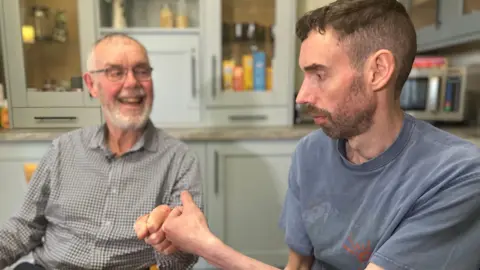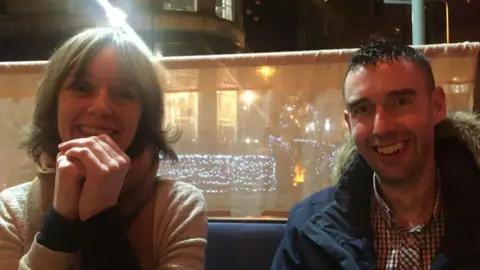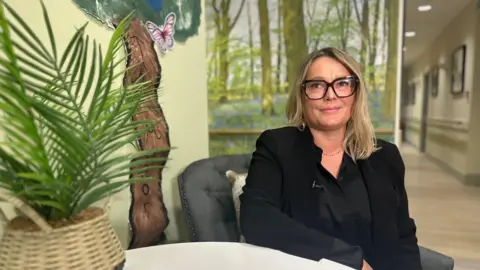Young-onset dementia patients 'falling through gaps in care'
 BBC
BBCWhen someone develops dementia before the age of 65, it is known as young-onset dementia. Thousands of people in the UK have been diagnosed with the condition and each one will have specific care needs.
To look at David Sincock beating his dad Ian at snooker, you wouldn't think he had any health problems.
The 48-year-old, a former Home Office civil servant, was diagnosed with young-onset dementia in 2023. Today, he is largely non-verbal.
His sister, Dawn Sincock, says the symptoms of his condition emerged gradually.
"We noticed that David was maybe mixing up times and dates, and travelling was starting to become a problem whereas before he was very independent.
"We got David an appointment with the GP and went from there. It was quite a lengthy process - lots of tests - and eventually in 2023 he was diagnosed with frontotemporal dementia."
David was initially looked after by his elderly parents at their home in Darlington, but in October he became a resident at The Manor at Eighton Lodge - a purpose-built unit in Gateshead for people with young-onset dementia.
In the eight-bed facility, he gets care targeted to his age group.
Rachel Beckett, from Wellburn Care Homes, which runs the unit, says younger patients have particular needs compared with the elderly.
"They're much more active, especially David. He walks every single day and the levels of care are very, very different.
"[The Manor] is very much like a home. It's a much smaller unit and the kitchen facilities are all open and accessible, which you couldn't do in an elderly residential home."

Dawn says her brother has made progress since his arrival.
"As soon as David came here we had reports that he'd started responding more and instead of giving a thumbs up or thumbs down, he was maybe communicating more and getting more enjoyment out of activities and still being able to do the physical activities that he needs."
People diagnosed before the age of 65 are generally classified as having young-onset dementia.
Alzheimer's Research UK says 5% - about 70,000 - of the total number of dementia patients in the UK are classified as young-onset.
It is unclear how David's condition will develop, and now it is uncertain where he will live.
He has been paying for his own care at The Manor and his house in Huddersfield, West Yorkshire, is being sold.
But with his savings now running out, Gateshead Council has not confirmed whether it will take over the cost of him staying there.
His parents both have ongoing illnesses and say they are unable to look after him at home.
Ian is 77 and has cancer. He says the uncertainty about his son's future is difficult.
"The stress is unbelievable because it's continuing," he says. "Going forward, I want David to have the best possible quality of life while he can in an environment that suits him."
His sister is also concerned.
"It's just the constant worry for the family," she says. "Because we don't know if there's a future here and how David is going to be cared for."

The North Yorkshire-based charity Dementia Forward says young-onset patients are falling through gaps in the care system across the country.
The charity's chief executive, Jill Quinn MBE, says there is "a vacuum" in terms of age-appropriate care for people.
"There's extremely poor data [on young-onset dementia patients]. For example, in North Yorkshire it was estimated there were 173 young dementia patients, but Dementia Forward is currently supporting 450."
Councillor John Adams, cabinet member for adult social care at Gateshead Council, said "ensuring people get the best support to live as independently as possible" was the local authority's "top priority".
"This is key to our Home First approach, which focuses on supporting people to remain in their own home and communities for as long as they can," he said in a statement.
"We know that for many, living independently within a supportive community and appropriate solutions, such as tech-enabled care, leads to the best health and wellbeing outcomes.
"We cannot provide details of the support that is being offered to Mr Sincock for confidentiality reasons, but we can confirm that following recent contact for support, the council is concluding the essential assessment and working towards agreeing a suitable outcome as soon as possible."
If you have been affected by the issues in this report, there is help and advice available at BBC Action Line.
